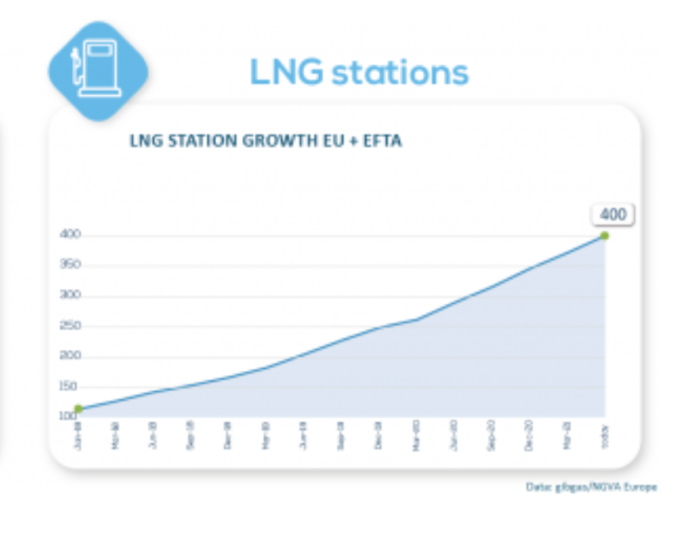According to analysis from NGVA Europe, the continent now has 4,000 compressed natural gas (CNG) and 400 liquefied natural gas (LNG) stations in its fueling network, and about 300 new CNG stations have achieved commercial operations in the last year – a growth rate of 8.1%.
At the same time, the number of LNG stations grew from about 250 to 400 – a spike of 60%. This huge gain is reflected in the increase in LNG vehicle registrations.
In 2020, there were 55,028 new registrations of passenger cars in addition to 3,189 new buses. According to ACEA, 11.4% of all new buses sold in the EU in 2020 ran on alternative fuels – and nearly all of them are powered by natural gas. The largest increase in registrations was recorded in truck sales: 6,802 new CNG and LNG trucks. Approximately 99% of all sold alternatively powered trucks run on natural gas.
In 2020, out of all gas fueling stations, more than 25% were already delivering biomethane to European consumers. This amounts to a 17% average of all gas used as a transport fuel. By 2030, a European average of 40% biomethane will be available to power the EU’s entire natural gas vehicle fleet which is currently estimated to include more than 13 million vehicles. Potentially, this could contribute to an overall greenhouse gas emissions reduction of 55%. NGVA Europe estimates that there will be about 10,000 CNG and 2,000 LNG stations in Europe by the end of the decade.
“These new numbers show that 2020 was another key year with growth in both vehicle registrations and infrastructure development – confirming the ever-growing attraction of gas mobility for European consumers,” says Dr. Jens Andersen, secretary-general of NGVA Europe. “They make this choice for a good reason: gmobility is a mature technology with not only high engine efficiency and performance, widespread infrastructure and low total cost of ownership (TCO), but also great environmental benefits.”
Natural gas infrastructure and vehicles are fully compatible with renewable gas and are therefore enablers of a reduction in GHG emissions. Today, gmobility represents the most cost-effective approach to the decarbonization of the transport sector and to achieving the EU’s intermediate 2030 and 2050 climate goals.






